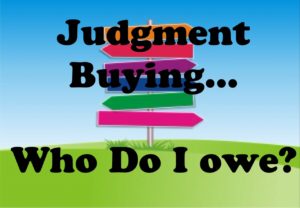By:Â Robert J. Nahoum
The Problem:
You head to the ATM for some cash or break out your debit card to swipe for the groceries and embarrassingly learn that your bank account has been frozen. Even worse, your boss calls you into his office to tell you that he received a wage garnishment for you. Turns out, you were sued by a debt collector; you didn’t answer the lawsuit and a default judgment was entered against you.
After you get the court papers you call the attorney on the lawsuit and are told that they are no longer on the case. Not only is there a new attorney, there’s a different debt collector telling you to pay it instead of the one that sued you.
What do you do now? How do you know who to pay? How do you know if you should pay?
There is a trend developing in New York debt collection in which debt buyers are buying from creditors and other debt buyers, judgments that have sat dormant for years. These judgment buyers are dusting off old judgments to see if they can shake some profit loose from consumers.
The Rule:
For a debt buyer to buy a judgment and step into the shoes of a judgment creditor, the debt buyer must follow the prescribed procedure. New York Civil Practice Laws and Rules (“CPLRâ€) Section 5019(c) provides in relevant part that “[a] person other than the party recovering a judgment who becomes entitled to enforce it, shall file in the office of the clerk of the court in which the judgment was entered […], a copy of the instrument on which his authority is based, acknowledged in the form required to entitle a deed to be recorded, or, if his authority is based on a court order, a certified copy of the order. Upon such filing the clerk shall make an appropriate entry on his docket of the judgment.â€
Cutting through the legal gibberish, a judgment buyer to enforce the judgment, it must make the appropriate filings with the clerk’s office. If it fails to do so, its efforts to enforce the judgment are invalid and should be dismissed.
What You Should Do:
If you discover that a judgment buyer is claiming to be the new owner of a judgment against you, check the clerk’s records to see if the judgment buyer has properly complied with the filing requirements, they often do not.
Also, it is important to understand that a judgment buyer is subject to the same defenses as its predecessor. If a default judgment was unknowingly entered against you, it can be “vacated†or undone. To do so, you must file an “order to show cause†with the court along with a sworn affidavit from you (the court clerks have forms). Your affidavit must swear to two points, (1) that you have a reasonable excuse for your default (like you were never served with the papers); and (2) that you have a defense to the case (like you don’t owe all or part of the debt or that you have never heard of the plaintiff).
If a judgment buyer has undertaken efforts to enforce a judgment against you based upon a faulty assignment of judgment, you may have a claim under federal debt collection laws known as the Fair Debt Collection Practices Act (FDCPA). The FDCPA is a federal law that regulates the collection of consumer debts. It precludes third party debt collectors from using false, misleading, deceptive and harassing debt collection tactics.
If a judgment buyer violates the FDCPA, you can sue it for statutory damages up to $1,000.00 plus actual damages (like pain and suffering) and your attorney’s fees. In FDCPA cases, good consumer lawyers don’t charge their clients a penny out of pocket.
The Law Offices of Robert J. Nahoum, P.C
(845) 232-0202
www.nahoumlaw.com
info@nahoumlaw.com

